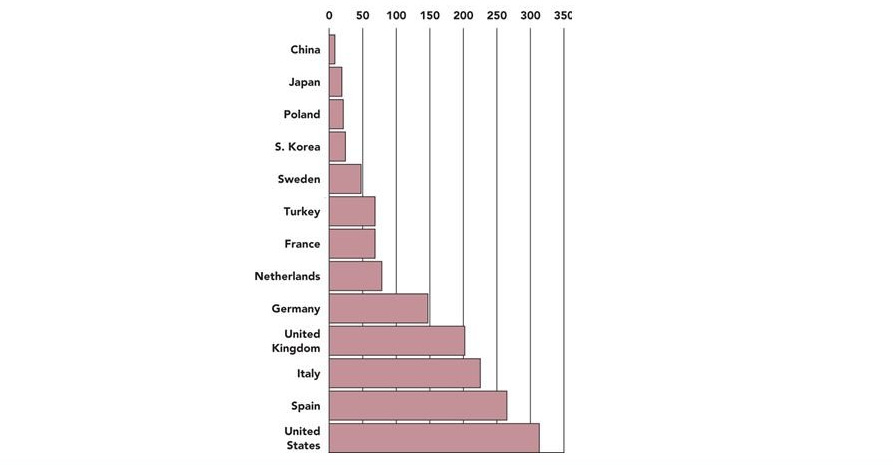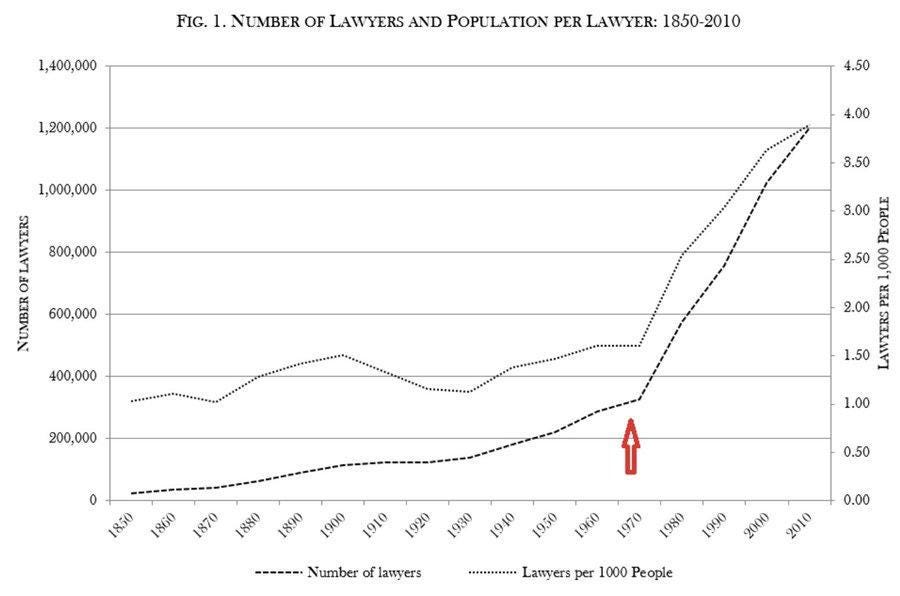Fewer Regulations in America?
Today: It’s not that the US has fewer regulations, it’s that it has more lawyers.
The Agenda 👇
More lawyers in America
More discussions about regulations
More tech giants to tame regulators
Don’t forget regulations at the local level
Regulations as a matter of pride in Europe
Thomas Philippon and the Koch Network
We’re one week from the most consequential US presidential election in our lifetime, so it’s no surprise that America is top of mind for me these days. Today, I’d like to share a brief essay about regulations, and the difference between Europe and America from that perspective.
A few weeks ago, Paul Graham published this tweet:

What immediately came to mind was the following phrase:
There are fewer regulations in America.
It’s a phrase I read a lot, albeit formulated with different words. And regulations are part of “my field” since I spent a few years working in government.
It’s also a phrase that I come across a lot because comparing Europe and America on entrepreneurship and building large tech companies is my trade, and I read a lot of articles and essays that try to explain why America is doing so well while Europe is lagging behind.
As you probably know by now, my personal view is that Europe suffers from its fragmentation, which exists in multiple dimensions: languages, cultures, and regulations.
Meanwhile, many Americans, especially in libertarian Silicon Valley, think that the main problem with Europe is that there are too many regulations—while the US is some kind of a freedom paradise where entrepreneurs can do whatever they want.
Well, I’d say that Uber and Lyft would beg to differ, as illustrated by this very recent article: California appeals court rules Uber, Lyft must reclassify drivers as employees.
But beyond throwing out a few relevant examples, I thought about systemic reasons why Americans think that theirs is a less regulated economy—and why that is mostly false.
First, the US is highly regulated, in some cases much more so than Europe, but there’s a reason why many firms and entrepreneurs don’t realize it: they’re used to throwing lawyers at any regulatory problem they encounter. That’s easily done in the US because there are so many lawyers; less so in other countries, because there are fewer lawyers per capita compared to America.
Here’s a chart presenting the number of lawyers per 100,000 people in selected countries (not sure about the original source, but you can find it here).
Why are there so many lawyers in the US? I guess it’s a combination of two factors:
Studying law is one of the most prestigious paths you can pursue as a young aspiring professional in the US. Many prominent members of the local elite have a legal background, so law is a career that is attractive to many: therefore if the country as a whole needs more lawyers to deal with more regulations, there won’t be difficulties attracting more students, and they will deal with the extra regulatory burden.
Another factor, in my view, is the fact that the law has become a central part of American business life, starting in the 1970s: exactly when leading American firms began to compete with fast-growing foreign firms, notably from Japan, with economic growth slowing down at the same time.
As a result, companies had to explore new ways of finding a competitive advantage, and litigation and lobbying the government were two of them. As explained in the masterful book The Big Con by veteran journalist Jonathan Chait, it translated into the fast growth of a new industry, lobbying—which, as you can guess, is populated with many lawyers.
So not only do you have the supply (students willing to pursue law as a career), you also have the demand (companies seeking to hire lawyers to help them secure competitive advantages), which explains the following chart:
My thought is that there are so many lawyers that anyone for whom law is not their core business tends to forget that there are actually many regulations that these lawyers are dealing with. I wrote as much in my 2016 essay Regulating the Trial-and-Error Economy:
In countries governed by common law, a judge can interpret the application of a law in an individual case; and if this decision is confirmed through the highest jurisdiction (in the United States, the Supreme Court), it becomes precedent: the text of the law itself is submitted to this interpretation. Common law is thus more favorable to innovation: as new technologies render rules obsolete, courts have a wide margin in which to maneuver in reinterpreting the rules, ignoring certain applications, even installing new rules. Innovative companies are thus incentivized to mobilize their (abundant) capital to pay for lawyers and accelerate the evolution of the rules through litigation.
Second,there’s the fact that most discussions over regulations happen within US-centric circles. Europeans enact regulations and have to comply with them. But Americans do more than that: they talk and write about said regulations, notably within law schools, think tanks, lobbying firms, and others.
Therefore, the impression that there are more regulations elsewhere reflects a cultural/language gap: it's not the regulations per se, it's a difficulty in understanding them when they emanate from a foreign government. Most global discussions about regulations happen in English with a US-centric view (think about Ben Thompson of Stratechery being a leading expert on the European Commission regulating the tech industry). But since those regulations look and sound foreign and are thus more difficult to apprehend, it leads to the impression that there are more of them in Europe than in America.
In reality, there’s nothing of the sort: regulations in America are part of the landscape, written in plain American English, and handled by talented lawyers; when they’re in Europe, on the other hand, they look foreign and overreaching.
Third, if you consider the specific case of the tech industry, the impression that there are fewer regulations in the US is because there are many very large tech companies there as well, and together they can summon formidable lobbying power to tame regulators. By comparison, regulations in Europe seem more out of control: there are no local tech giants to contain local regulators, and when US tech giants try to do so, they’re viewed as a nefarious foreign influence. Their influence over regulators is quite limited as a result.
Just wait until Europe has its own tech giants, and you’ll realize how their presence makes local regulations less visible—and less of a constant pain.
Fourth, there’s this impression that regulations exist at a national level and that you need to compare one country to another. But as Uber and Lyft have come to understand recently, regulations also exist at the local level (state, regional, city). When considering the US, most people overlook the local level and don’t realize that there are many sectors where Europe is less regulated than America because we have this thing known as the single market while in the US there’s a different set of rules in each of the 50 states. Byrne Hobart once remarked to me that this is especially the case in insurance:
There are a handful of markets where fragmentation works in the opposite direction: in insurance, Lemonade has to get licensed by every state in the US, but they have one license for Europe that permits them to operate in 41 countries(!). So I'm keeping an eye out for a European insurtech company that wins in Europe and then expands into the US...
Fifth, for some reason, Europeans have turned “Regulating Big Tech” into a political slogan, which gives the impression that we regulate more here. But you should look at actions rather than words. In part, ‘regulating big tech’ is a code word for saying ‘keeping foreign companies at a distance’. And in any case the Americans have been catching up fast on that front, since now Republicans as well as Democrats are tackling the challenge of taming big tech companies—albeit with very different motives.
Let me conclude with two interesting snapshots:
My friend Thomas Philippon, a brilliant economist who’s a professor of finance at New York University, wrote this landmark book about the reversal of fortune in terms of who has the freer market. It used to be the US, but now it’s Europe. Have a look at this overview in The Atlantic: Europe, Not America, Is the Home of the Free Market.
Meanwhile, proof that there are many segments of the US economy that are overly regulated lies in the existence of this widespread effort, funded in part by the Koch Network, at dismantling backward-looking regulations like occupational licensing in many sectors, and a few other things as well (regarding preserving the environment, regulating what drugs can be brought to the market, or building charter cities).
I’m not saying the US should abolish all regulations, although I think it tends to have a highly bureaucratic, backward-looking approach to designing and implementing regulations—and Americans don’t even realize that because of all the lawyers.
In my view, the very existence of a lobbying effort to get rid of regulations in many industries is proof that the US is far from being the libertarian paradise that we hear about in Silicon Valley—and that Europe has nothing to be ashamed of when it comes to its own set of regulations.
Go further with this landmark 2015 white paper by Nick Grossman of Union Square Ventures: White Paper: Regulation, the Internet Way.
And let me know what you think!
If you’ve been forwarded this paid edition of European Straits, you should subscribe so as not to miss the next ones.
From Normandy, France 🇫🇷
Nicolas







